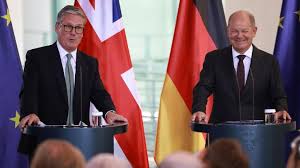Starmer says ‘ambitious’ reset with Europe will not mean reversing Brexit

London: Prime Minister Keir Starmer and German Chancellor Olaf Scholz shake hands at the end of a joint press conference at the Chancellery in Berlin, during his visit to Germany and France.
Prime Minister Keir Starmer has wrapped up his visit to Germany and is now heading to Paris where he’ll meet France’s Emmanuel Macron on Thursday.
We’ll shortly be closing our live coverage but for now here are the key moments from the PM’s meeting with Chancellor Scholz:
The UK and Germany hope to sign a new bilateral treaty “by early next year”, according to a joint declaration, external released after the meeting on “deepening and enhancing” relations
Starmer said the plans are part of a wider “reset” of relations with the European Union
The treaty, though, will not mean “reversing Brexit” or re-entering the single market, the PM said
He argued that it will “deliver for working people”, having a flow on effects on areas including trade, business and technology
It will contain a joint action plan to tackle illegal migration, but won’t have a youth mobility scheme, the prime minister said
Starmer expressed sympathy for the German people following the attack in Solingen on Friday, in which three people were killed
Both Starmer and Scholz reaffirmed their ongoing support for Ukraine “for as long as it takes” and “the need for de-escalation” across the Middle East
This is the fifth time Keir Starmer has met the German chancellor since he became prime minister last month.
His attempt to reset relations with European neighbours has been a central theme of his first few weeks in office.
But it remains unclear what, if anything, the UK will have to give in order to get the closer collaboration that Keir Starmer seeks.
The treaty announced with Germany today is purely bilateral, and on defence it is possible to see how a framework could develop.
The UK already has bilateral defence treaties with France, for example.
But how feasible will it really be to deepen trade ties, where the context of Germany being in the EU is impossible to ignore.
It was striking to hear Starmer reiterate publicly that his government has no plans to agree to an EU proposal that could allow young people to live in the UK for up to four years – and vice versa.
His commitment to closer relations with European leaders is real, but it only goes so far – conscious of the political landscape at home.





